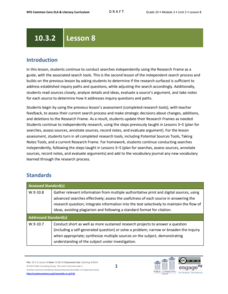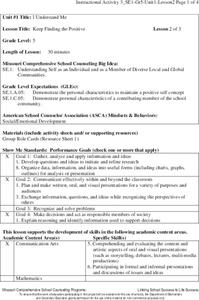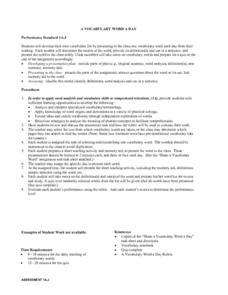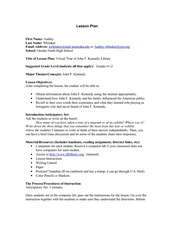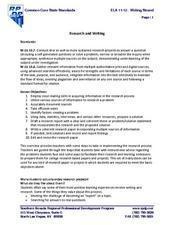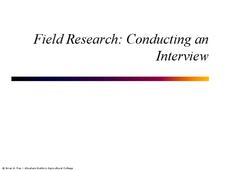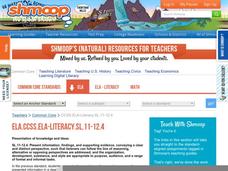EngageNY
Introducing Module 4B: “Water Is Life”
Learners take a gallery walk around the classroom to view various images and quotes. As they walk, they write down what they notice and wonder about what they see. After discussing their notice and wonder notes, they read the...
Curated OER
Light and Elements
Here is a full-fledged investigation of light waves, the electromagnetic spectrum, and element spectra. Physicists research a scientist that contributed to our understanding of the behavior of light. They take notes on your lecture, and...
West Contra Costa Unified School District
Introduction to Conditional Probability
Here is a turnkey instructional activity that walks young statisticians through the development and uses of conditional probability. From dice games to surveys, Venn diagrams to frequency tables, the class learns how a given can effect...
It's About Time
Effect of Lenses on Light
Optometry jokes just get cornea and cornea. Young scientists use a lens and light to create and measure focal points on both a note card and the wall. They then complete a reading passage and questions as homework.
NOAA
Technology I
Isn't technology great? The 12th installment of a 23-part NOAA Enrichment in Marine sciences and Oceanography (NEMO) program introduces technology that marine scientists use. Pupils take part in an activity using conductivity,...
EngageNY
Why Were Logarithms Developed?
Show your class how people calculated complex math problems in the old days. Scholars take a trip back to the days without calculators in the 15th installment of a 35-part module. They use logarithms to determine products of numbers and...
EngageNY
Grade 10 ELA Module 3: Unit 2, Lesson 8
Take it one step at a time. Scholars use the steps learned in lessons three through five to guide their independent research. While using the steps, learners complete research tool organizers to record their thinking, sources, and...
EngageNY
Local Sustainable Food Chain: Determining Cascading Consequences Using The Omnivore’s Dilemma
What are the consequences of the local, sustainable food chain? Research teams explore the question as they review Michael Pollan's The Omnivore's Dilemma. The teams complete Cascading Consequences charts and then choose research topics...
Teach Engineering
Clean it Up!
Harness the power of bacteria. Scholars see how using organisms that exist in nature can help solve human problems in the process known as bioremediation. They research and discuss several successful examples, such as using oil-eating...
Teach Engineering
How Antibiotics Work
Take two pills and call me in the morning. The first lesson in a short unit of four introduces class members to delivery methods of medicines. The instruction introduces the question of which delivery method is best to get you feeling...
ESL Holiday Lessons
Mardi Gras
Take a trip to Mardi Gras with a festive reading packet! After class members read an informational article about the history and celebration of Mardi Gras, they think about the structure of the passage by unscrambling words, filling in...
Channel Islands Film
Magic Isle: Lesson Plan 4
After watching West of the West's documentary on Catalina Island, The Magic Isle, class members research how Walt Disney's and William Wrigley's different visions impacted the island.
Missouri Department of Elementary
Keep Finding the Positive
Group members take on roles to create a positive classroom community. Learners perform their role—leader, recorder, presenter, timekeeper, encourager, and collector—in preparation for a formal presentation of their positive thinking...
Curated OER
No Plagiarism, Please!
Third graders listen to a lecture on how to take notes and discuss the skills of paraphrasing and correctly citing resources. They prepare note cards according to the format presented in class.
Curated OER
A Vocabulary Word a Day
Students research one assigned vocabulary word and prepare a short teaching activity and memory aid to present with the word to the class. They take notes on all the new vocabulary words presented to them by other classmates then they...
Curated OER
The Long and Short of It: Summarizing Important Details
Students practice their summarizing skills while listening to a brief biography of Amelia Earhart. Students take notes while the teacher reads the article and write a paragraph that summarizes the important events from Amelia Earhart's...
Curated OER
Virtual Tour of John F. Kennedy Library
Students take a virtual tour of the John F. Kennedy Presidential Library. For this Kennedy presidency lesson, students access the library via the Internet and take notes on the experience. Students write essays using the information they...
Southern Nevada Regional Professional Development Program
Researching and Writing
Designed for teachers, this resource identifies problems learners face when attempting a research project and approaches instructors can use to help their class members overcome these obstacles. Suggestions are included for how to help...
Curated OER
Research, Production, and Presentation of Abstract and Pop Art
Young scholars analyze Abstract Expressionism and Pop Art. They view and discuss artworks by Warhol, Lichenstein, Pollack, and Kandinsky, research a specific artist, and create an art piece in the style of their chosen artist.
Curated OER
Author's Purpose: Research Process/Narrative Writing Techniques
Determine the author's purpose in writing a memoir. Eighth graders work in groups to elicit author's purpose in memoirs, taking care to note how subtle the message can be hidden throughout the work. This lesson is a good way to...
Curated OER
Field Research: Conducting an Interview
Go through the proper steps to setting up and conducting an interview as part of research. Slides detail preparation, materials you should have, and follow-up procedures. Specific questions for the interview are not suggested but the...
Curated OER
Science Fair Frenzy
Pupils examine the steps for developing science fair projects. They visit stations where they examine posters, books, and paper that describe how to research and design a science fair project. Additionally, they take notes on how to...
Shmoop
ELA.CCSS.ELA-Literacy.SL.11-12.4
Study allusions with a research and presentation project. Pupils are assigned a specific allusion, the phoenix for example. They research the origins, compose a summary, explain the concept, and explore this allusion within various...
Curated OER
Plants: Report Planner
Introduce your young learners to the basic research project. They explore plants using a three-page note-taking guide. On the first page, they write down things they would like to know about the topic and where they might look to find...








